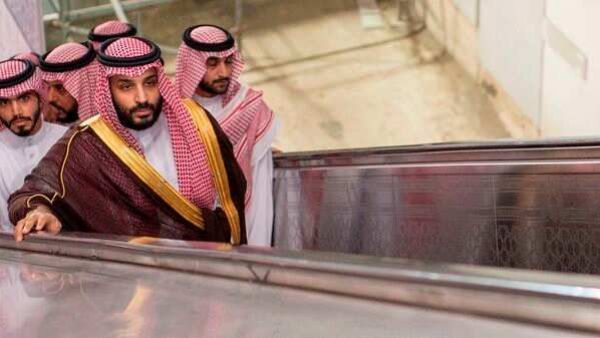Little was known of Mohammed bin Salman, or MBS, when he rose to the position of Crown Prince in Saudi Arabia’s ruling family in 2017. He was young – but it wasn’t even clear how young.
Media organizations had to describe him as “around 30 years of age.” He seemed to have little experience when compared with other high-ranking members of the Saudi royal family. But he was, and has continued to be since 2015, at the head of the world’s most profitable company, Saudi Aramco.
A new biography by the New York Times reporter Ben Hubbard, MBS: The Rise to Power of Mohammed bin Salman, attempts to provide a picture of the man’s beginnings. Many of us will have a picture of the prince as possessing a quality of ruthlessness; his seeming hand in the murder of Jamal Khashoggi in 2018, and the arrests of other members of the royal family inside the Ritz-Carlton in Riyadh. But Hubbard’s book draws our attention to the personal ambition of MBS and the methods he used to become the de facto ruler of Saudi Arabia.
Hubbard’s book draws our attention to the personal ambition of MBS and the methods he used to become the de facto ruler of Saudi Arabia
Born in Riyadh in 1985, MBS had possessed relatively little wealth compared with other members of the royal family. He did not attend a university in the US or UK like other senior figures, nor did he do particularly well in private business ventures during his twenties. He did, however, show signs of an unorthodox approach to real estate purchases.
One well-circulated story has it that when an unwilling seller proved unpersuadable, a bullet (or two, as some versions have it) was sent in an envelope to the cleric in charge of the would-be transaction.
When MBS’ father became the monarch, MBS was put in charge of the Ministry of Defence and the Royal Court, a position that allowed him to control the House’s finances as well as who gained access to his father. MBS got to work with his advisor’s and restructured the government. A royal decree was issued, abolishing various government departments and replacing them with two supreme councils, both of which MBS would soon lead. His consolidation of power had begun.
When MBS’ father became the monarch, MBS was put in charge of the Ministry of Defence and the Royal Court, a position that allowed him to control the House’s finances
Whilst political power was being taken care of, MBS began to accumulate a personal fortune. Having watched his wealthier cousins live large with elaborate holidays, fleets of cars, and rows of expensive watches, he now began to match them. The prince bought a yacht from a Russian tycoon for $456 million, a company he was linked to purchased a 30,000-acre ranch in South Africa with a runway large enough to land 747s, and in late 2015 MBS paid over $300 million for a chateau to the west of Paris, once described as “the world’s most expensive house.”
Some of the most telling passages in Hubbard’s book are to do with MBS’s relationship with the Obama administration. Though most of the US team saw little significance in the prince during early meetings, it became clearer over the time that MBS was edging closer to his father’s seat.
“As they spoke, the Americans noticed the king’s iPad, perched before him on a coffee table adorned with lime green flowers and dishes of candy. The elderly monarch paid close attention to it when he spoke. During previous meetings, some of the officials had seen MBS, or one of his aides, sitting elsewhere in the room and typing on another iPad, presumably dictating talking points to the king. The only place that system did not work was in the Oval Office, where foreign guests could not bring electronics, so there, MBS had resorted to conspicuously passing handwritten notes,” writes Hubbard.
Meetings with the Obamas frequently disintegrated and on one occasion even saw MBS stand up in the middle of a meeting to shout at Obama. Irritated at the US policy of placating Iran and thin-skinned over criticism of Saudi Arabia’s human rights record and treatment of women and minorities, MSB struggled to impress the outgoing president. They did, nevertheless, manage to a $65bn arms agreement.
Meetings with the Obamas frequently disintegrated and on one occasion even saw MBS stand up in the middle of a meeting to shout at Obama
The tide turns when Trump takes office and MBS becomes friendly with Jared Kushner. The two would frequently exchange messages and emoji’s over WhatsApp to the surprise of US officials who would learn at the first meeting between MBS and the US that Kushner and the prince had talked previously on several occasions. During Trump’s visit to Saudi Arabia after his inauguration, an arms deal was signed worth $110bn.
Hubbard traveled to Yemen and saw the effects that these arms were having on “the poorest nation in the region, by the wealthiest.” MBS is portrayed as the kingpin behind the push for a war in Yemen against the Houthi’s and as the mind behind the economic warfare waged on that country. The author describes decimated docking cranes needed to offload medical supplies, food, and water from cargo ships.
The author describes decimated docking cranes needed to offload medical supplies, food, and water from cargo ships.
The targeted destruction of factories in which, in one instance, workers burned at their stations after being bombed by US weapons and supported by a US government. This has now led to potentially the worst famine in a century, putting more than 13 million civilians at risk of starvation.
There have been some changes in the country and the book covers them in some detail. Greater freedoms for women, particularly women drivers, less power to religious clerics who were often tyrannical, and a long-term move away from reliance on fossil fuels is how MBS would like us to see his leadership. But this is hard to stomach alongside widespread human rights abuses inside the country and possible war crimes outside.
It seems almost certain that MBS will be the next king of Saudi Arabia. Now at the age of 34, he will likely be leading the country for decades to come. If the last five years are to go by, those could be very bloody years indeed.
Ben Hubbard’s ‘MBS: The Rise to Power of Mohammed bin Salman’ is published by William Collins and was released earlier in the year.







